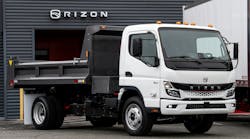If you run a restaurant and need to dispose of your used vegetable oil, then Got Grease is a company to call. Got Grease doesn’t just collect this waste, though, it uses it to power those same trucks that are picking up restaurants’ discarded oils.
Got Grease, a family-owned San Francisco-based business, is turning that waste into a sustainable business powered by biodiesel. The company services about 1,800 Bay Area restaurants, delivering the waste product to a local biofuels converter and then using the finished product to power its trucks.
“We believe running our trucks on biodiesel aligns our actions with our mission,” co-owner David Levenson says. “Our goal is to [deliver] waste vegetable oil from restaurants for biodiesel, so why not [use] it ourselves?”
The entire fleet of Got Grease, which includes three Ford F-650s, three International models (a 4300, 4700, and 9200), a Peterbilt Model 330, and one each of a Ford F-450, F-550 and F-800, runs on biodiesel blends ranging from B20 to B50. Even Levenson’s Volkswagen TDI, which he uses for sales calls, is powered by biodiesel—in that case a B100 blend.
And it’s biodiesel that Got Grease has played a role in producing. “Every year we collect about 900,000 gals. of vegetable oil from the restaurants, which translates to about 830,000 gals. of biodiesel,” Levenson says.
Levenson estimates the fleet uses about 1,500 gals. of fuel a month, all purchased from Dog Patch Biofuels.
KEEPING IT LOCAL
According to Levenson, Got Grease picks up the vegetable waste and stores it in an on-site warehouse until it is picked up by Bently Biofuels. Bently converts the grease into a finished product. The whole process takes about two weeks.
“After doing market research, we realized there were many benefits to using biodiesel created from waste vegetable oil,” Levenson says. “The waste derived from restaurants adds a great benefit to our economy by keeping our fuel and money flowing in our [local] economy. In addition to the environmental benefits, [using locally produced] biodiesel seemed like the right thing to do to help keep jobs local.”
Levenson adds that the fuel, in addition to being cleaner burning than straight diesel, is resulting in less wear and tear on engines.
“Biodiesel works as a lubricant to ensure our engines remain healthy and has become very helpful as a blend with low sulfur diesel,” he says.
In addition to the use of biodiesel, Got Grease has found success with a software product from FoundOps. The cloud-based software fills a number of roles, one of which was the ability to automate routes for the fleet’s vehicles. This has led to more efficient routing as well as time savings.
“The overall goal was to track our customers with a software that helps minimize time spent on organizing routes,” Levenson says. “There are many unique features available in the cloud that make FoundOps a unique software that we could not find elsewhere in the marketplace.”
The software factors in road speeds, truck capabilities, stops, and more in making its recommendations, FoundOps says, adding that the software is up to 75% more efficient than humandeveloped routes. It also has replaced Got Grease’s paper record system with an all-digital operation with automatic data backup.
“As our company grows, providing good service has become a very tedious task,” Levenson points out. “The software we use has allowed us to track all of our customers, the frequency at which they need service, as well as a history of our interactions with them as a customer. Having detailed information about our accounts is a big help in keeping our customers happy.”


